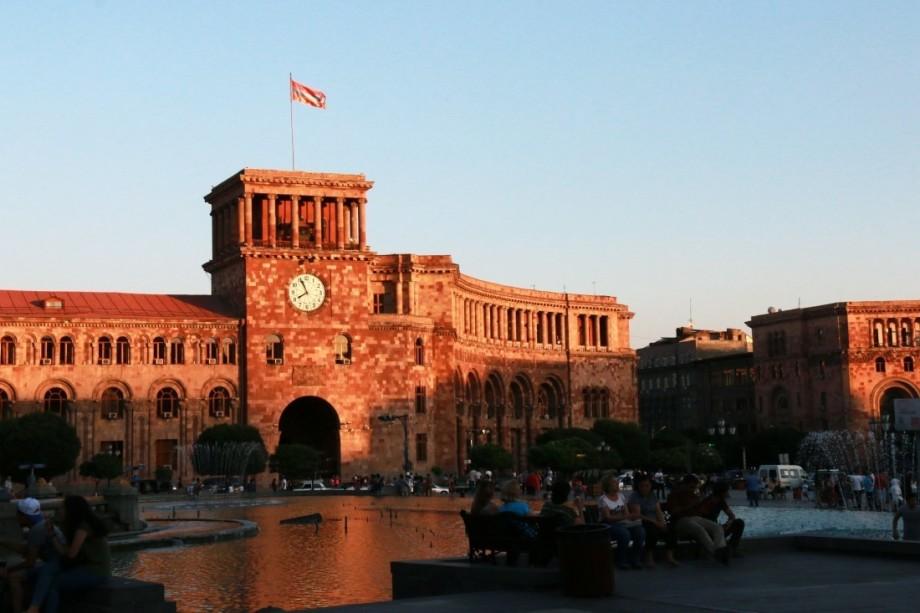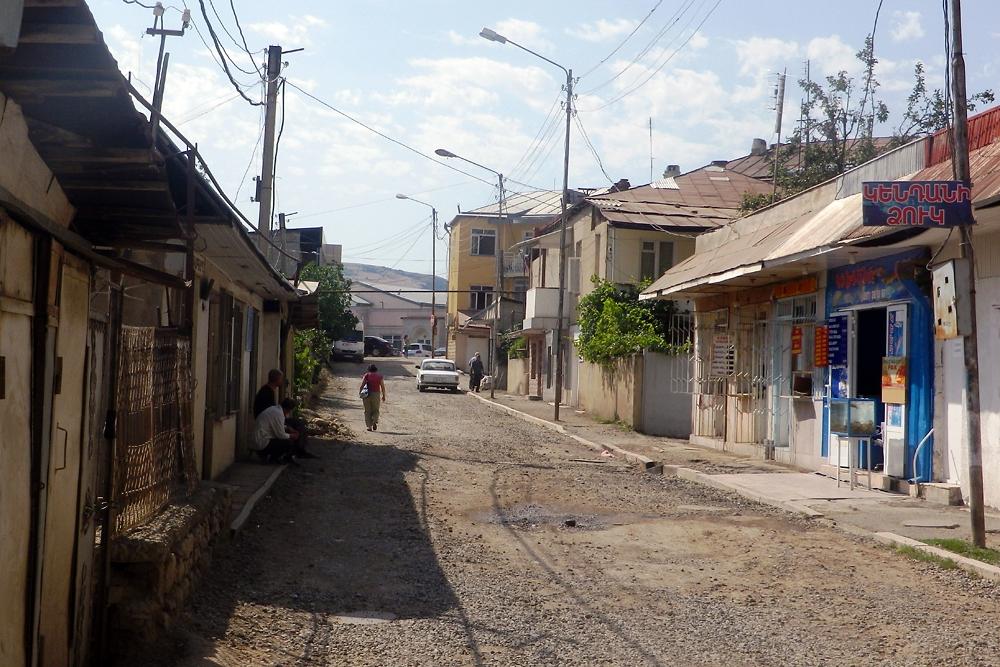"Artsakh" fading away, or moment of truth Thoughts of Emin Galali
Watching the events of recent days in Armenia, I involuntarily thought about the uniqueness of the sociopolitical processes in this country. Like every Azerbaijani, I perceive what is happening through the painful prism of a nightmare that has been imposed on us since the late 80s. But if we abstract the events, as far as possible, from the emotional and personal background, we can observe a picture that is very interesting from the point of political science and sociology views.
After the defeat in 2020, Armenia is also failing on the diplomatic front, including the ensuing military-positional mise-en-scene. This is not a “self-congratulatory” conclusion of an Azerbaijani who is happy with the restoration of the violated justice, this is a statement of facts. A combination built on the fundamental and constant elements of a multi-vector foreign policy and the maximum use of opportunities while minimizing the risks of inconveniencing some of our priorities for some key players is yielding results. And these results are evident. Each is remarkable individually, but they must be considered as a whole because this makes it possible to properly assess the scale and significance of the further steps. I am deliberately limiting myself to 2022 because trying to dive deeper will turn the article into an indigestible opus.
Since early 2022, Azerbaijan has drawn lines between points lying on diametrically opposite sides. Visit of Azerbaijani President Ilham Aliyev to Kyiv. Ratification of the Shusha Declaration. Moscow visit and signing of the Declaration of Alliance. Azerbaijan's activity in the Russian-Ukrainian confrontation. Meeting in Brussels with the President of the Council of the European Union and the Prime Minister of Armenia. Dozens of meetings both in Baku and abroad and even more telephone conversations. Clarification of the positions of the Azerbaijani troops and their redeployment at several points. More than a few experts were racking their heads, trying to understand the almost shuttle diplomacy and humanitarian activity conducted by Baku. Some hastened to declare them tossing amidst a shrinking ring of irreconcilable contradictions. An explosion of glees from enemies, both external and internal, amidst the stupid statements of the Russian State Duma member, Mikhail Delyagin, and their inescapable longing after the Kremlin’s formidable shout at the “deviant politician” elected by the Russian people, who hurried to appear with quite indigestible apologies.
There are very serious contradictions. But Azerbaijan manages to find even the subtlest bit of coincidence of interests. In some cases, is initially present and needs to be identified and used, sometimes we take upon its creation. Amid this, noticeable shifts have taken place in the positions of international organizations, which until recently were somewhat vague about certain issues related to the territories liberated from occupation. A joint assessment mission of the UN, the EU, and the World Bank (WB), discussions of post-crisis development with the UN system in Shusha, a major international conference on humanitarian demining, assurances of the EU about its readiness to participate in the restoration of liberated lands and demining, the intensification of the activities of other international partners - all this is built into a whole picture in which the elements complement and reinforce each other. This is achieved through careful planning and healthy opportunism. Healthy because Azerbaijan has not changed its position on the territorial integrity of Ukraine and Georgia, despite the importance of its partnership with Moscow. And since we do not change this position in favor of the ongoing situation, the Kremlin takes it for granted and does not consider it as a reason for cooling relations.

But the story’s introduction refers to the situation in Armenia, and the article focuses on the successes of Azerbaijan, a critic will say. But what is happening in the neighboring country does not pass without a touch on other residents of the region. Particularly, when it comes to such special, almost "heartwarming" relations as those that connect us with Armenia. So our decisions and steps to a large extent determine the agenda in Yerevan. And step by step, we find ourselves a few jumps ahead.
I have once tried to guess what Pashinyan was thinking. I'm not going to resort to telepathy again, but the Prime Minister of Armenia, who has muddied the waters by dancing on Azerbaijan’s Jydyr Plain and voiced the pretentious “Artsakh is Armenia, and that’s it” call, is still not a stupid person. This is what allowed him to come to power. This is what allowed him to save his office after a devastating defeat on the battlefield, becoming one of the very few politicians of our time who bagged such a success. He understands the inevitability and necessity of moving away from certain postulates of Armenianism, which for many decades seemed unshakable and undiscussable. Moreover, we observed the first signs of this many months ago, when he dared to question the “Armenianhood” of some settlements liberated by Azerbaijan and, in fact, repeated the question that we untiredly ask the whole world - if these were Armenian lands, then why are they in such a deplorable condition (did I mention Shusha)? The Armenians gave their prime minister a tacit mandate of confidence to carry out actions that were previously considered impossible. However, revenge-seekers wandering in Yerevan, in the futility of attempts have been trying to bring Armenians to the streets under the cries of “shame on the jungle” of the playful jackals of Tabaki, appealing to the Armenian hatred against everything that is Turkish, Azerbaijani and Turkic.
Could anyone in Armenia say three years ago that it is dangerous not to recognize the territorial integrity of Azerbaijan? I could probably say. But it would be a perverse suicide who chose to split the way up with his life, but to lose power is easy if he had it. And what about the story of the "flag" removed from the podium of the parliament? Preventing a group of Armenian parliamentarians to enter Karabakh by Russian peacekeepers? Or a recent statement voiced by Vigen Khachatryan, MP from the “Civil Contract” from the rostrum of the National Assembly: “Back in 1996, at the congress of the Armenian National Movement, Levon Ter-Petrosyan put forward the idea that the forcible domination of one nation over another is unacceptable for us, it was an idea that Karabakh has no future within Azerbaijan. Years have passed, and today we can say that it was, in my opinion, wrong. Where should we stop? Where should we understand what our goal is? Heroically die or live, develop and have a future?"

After all, the entire policy of Armenia, both internal and external, has always been based on the postulate, simple as a stump, "it's all ours here !!!". As I already wrote, the successful actions of Azerbaijani “doctors” in the fall of 2020 played a huge role in the positive dynamics of the treatment of rare diseases observed in Armenians, such as “brain artsakh” and “rectal miatsum”. But the “postoperative physiotherapy” carried out by Azerbaijan is also producing results. The fact that Nikol clearly understands the signals sent to him by us and other key players is quite expected. But it seems that these signals began to reach the majority of the population of Armenia.
And what about the Armenian opposition, stigmatizing the current government and bitterly complaining about the passivity of fellow tribesmen and their unwillingness to defend "Artsakh", which is completely withered? The weed planted in the garden of Azerbaijan is accustomed to generous irrigation thanks to the funds embezzled from the people of Armenia, injections of hatred, and aggressive plans to build castles in the air or the same masterpieces of architecture on the sand. Do the opponents of Nikol and his team not see the obvious and seriously hope to turn back the clock?
In my opinion, there are few such stubborn fanatics. The remaining part of the small uncompromising camp of Hayastan, which hung out the flag “I die, but do not surrender”, is not going to die at all. They are spurring on the horse of the humiliated pride and pseudo-genocidal bloodthirstiness of their people in the hope that this once menacingly hoof-beating horse will once again bring them to power. And then you can change the tone. But they do not understand that this horse is ridden to death by the unwillingness of Yerevan to use diplomatic ways of resolving the conflict until 2020, ridden by a blunt cut of army funds, at a time when Azerbaijan was building one of the most modern and powerful armies in the region, ridden by stupid foreign policy and the lost trust of the diaspora. And ridden horses are shot, aren't they?
Having listed to the discerning reader my understanding of the results, I should make it clear that I am not advocating a celebration of the completion of the process and arrival at the destination. The Armenian society was too long and too deeply hurt, and hatred gave powerful, hard to exterminate metastases. It is still not close to the end of the path for some kind of the poor living in the neighborhood, and in a sense the path is endless - life will pose new challenges. But we proved to everyone, and first to ourselves, the ability to successfully cope with them.
The Armenian society is approaching the moment of truth. And although the effect of the process is strikingly different from how the famous glue (Moment) of the same name works, and it is impossible to glue the broken in principle, I would like to hope that they will be able to use the awakening opportunity that we provide them despite the terrible chronicles of the last thirty years.
They won't get another chance like this.








